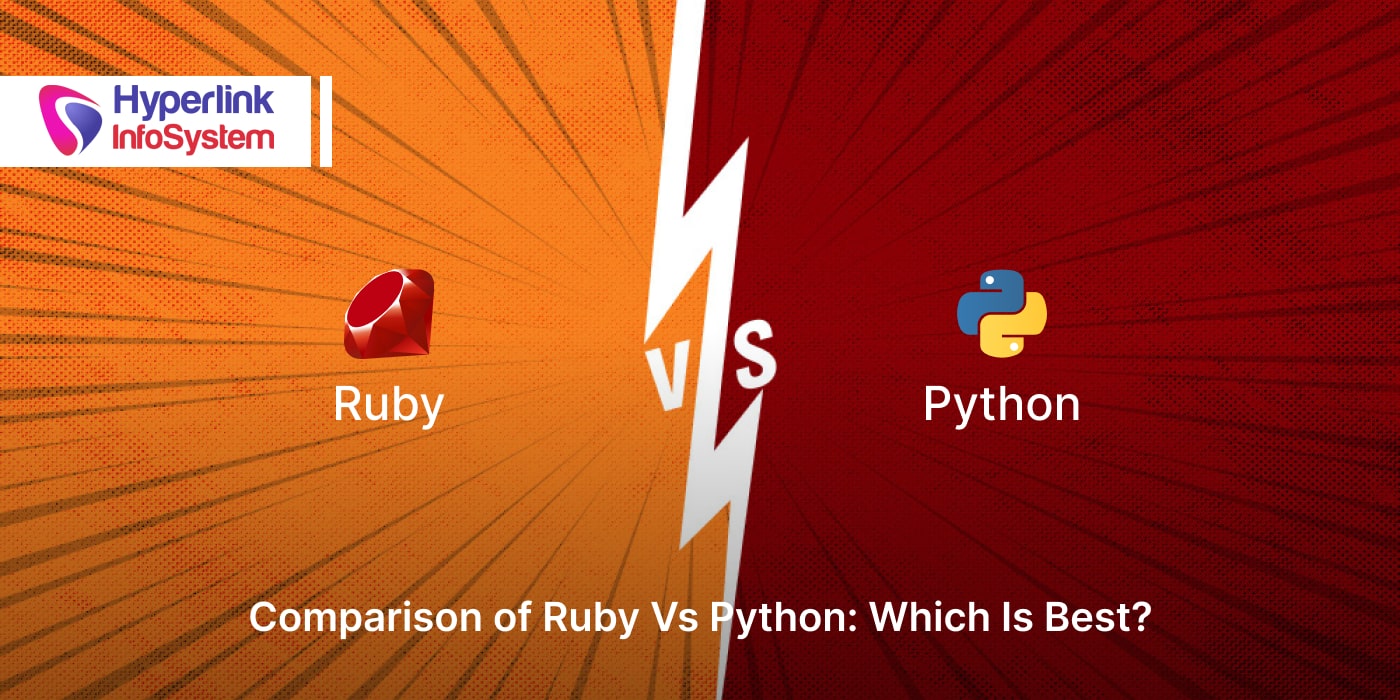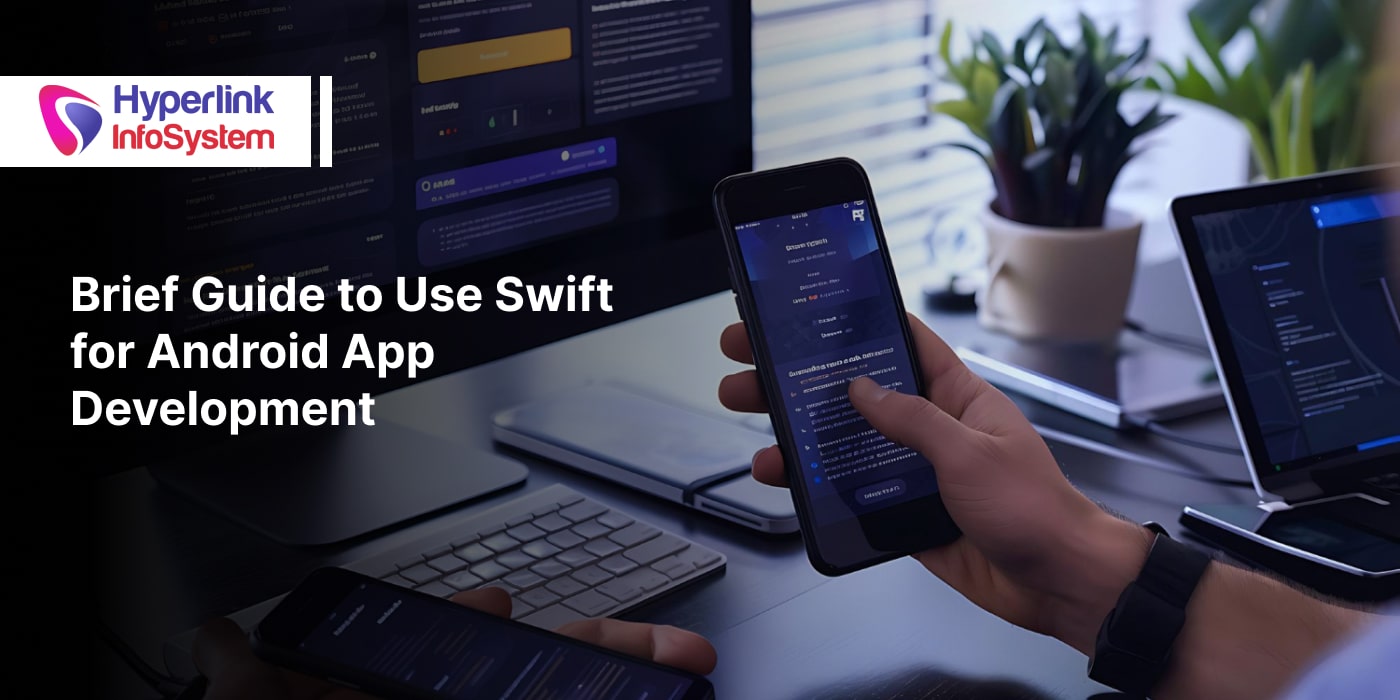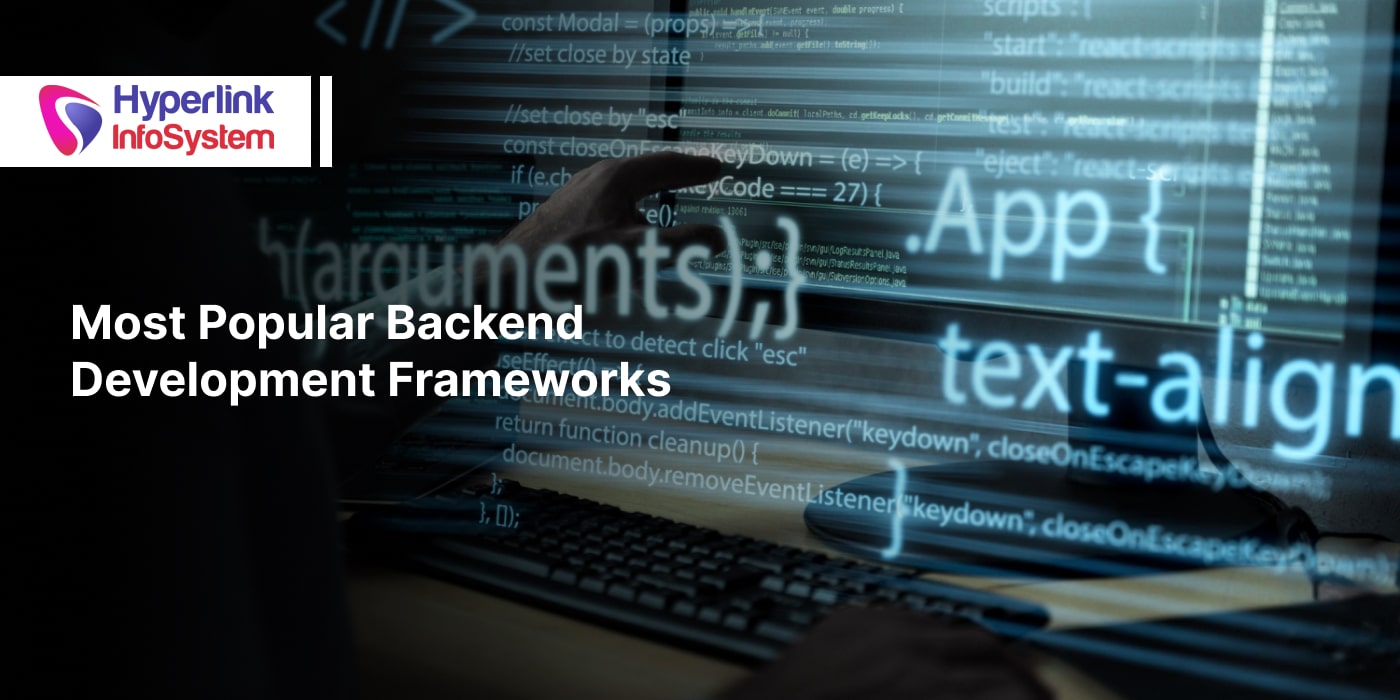Comparison of Ruby Vs Python: Which is Best in 2024?
Aug 2024

In the gigantic world of programming, countless languages are competing to get the attention of developers. Ruby and Python are among the many ubiquitous and adaptable programming languages, that have put developers at a crossroads. Although both have unfailingly held their ground, with their unique capabilities, they excel in distinct environments and cater to diverse development techniques. These two popular powerhouses have been incredible in building custom web application development and often leave developers confused on which one to adapt for their upcoming projects.
Whether you're going to launch a new software solution or just look to grow your existing offerings, having deep knowledge about the subtleties of backend programming languages is important. Not only does a full-stack development company determine the course of your endeavor, but it also empowers you to hire web developers to make informed decisions for your web development projects. In this blog, we're going to take a deep dive into the comparison between Ruby vs Python. From understanding their pros and cons to making head-to-head difference tables, we'll segregate the capabilities to help you choose the technology that'll meet your specific business requirements.
What Is Ruby?
Curated in the mid-1990s by Yukihiro Matsumoto, Ruby is a dynamic, object-oriented programming language that is known for ease of use, robust object orientation, and elegance. Ruby boasts a sturdy emphasis on simple coding and readability; it has been a popular choice for building custom web application development. It helps more if you charter your projects with a reputed Ruby on Rails development company. This language has been referred to as a “developer-friendly” solution, due to its clean syntax and agile development capabilities. Ruby was designed to craft data processing pipelines, robust automation scripts, and other development tools.
This rise in embracing the adoption of Ruby for web development heavily increases the demand to scout Ruby developers. The comparison of Ruby vs. Python is further exemplified due to its object-oriented nature, a sweeping ecosystem of libraries and frameworks, and the general-use language’s syntax. Ruby offers rapid prototyping and MVP development to develop interactive web solutions for multiple industries.
Also Read | Swift vs Objective-C
Features of Ruby
In the debate of Ruby vs Python, understanding the core capabilities of the Ruby programming language is vital.
- Metaprogramming
The robust capabilities of Ruby enable the dynamic development of classes and methods at runtime. Ruby's define_method function authorizes it to develop and modify code based on real-time data or reasoning, with the result being compact and DRY (Don't Repeat Yourself) code.
- Rapid Prototyping
Ruby offers adaptable syntax and dynamic characteristics, along with an intensive library of tools for expediting development. Furthermore, its metaprogramming abilities promote swift improvements and prototype mutations, optimizing duration and effort.
- Object-Centric
Ruby treats everything as an object, which includes booleans, numbers, and strings. This inherent object orientation fosters class definitions, inheritance, polymorphism, and encapsulation, hence endowing modular programming.
- Clean Syntax
Ruby developers expedite web development by utilizing its ease of maintenance and code clarity, all while boasting a syntax that mirrors natural language.
- Active Community Support
Whether you want to hire Ruby on Rails developers or just research any Ruby on Rails Development company, the first thing you'll glimpse is the thriving developer community. Due to its extensive libraries and frameworks, the ROR framework that's grounded inside Ruby stands tall among other solutions to craft scalable web applications.
Pros of Ruby
- Readability and Simplicity: Ruby's syntax is uncluttered and reflexive, making it uncomplicated to write and comprehend code.
- Productivity: Employing the Ruby on Rails framework, your tech innovators can swiftly assemble full-bodied web applications.
- Community and Support: Ruby has a vigorous digital society and a fortune of resources, including libraries and plugins, to boost the development process.
- Flexibility: Ruby is favorably flexible, permitting developers to adjust facets of the language to fit their conditions.
Cons of Ruby
- Performance: Ruby is frequently castigated for being slower than some other backend programming languages, which can be a problem for performance-critical apps.
- Concurrency: Ruby's concurrency prototype is not as strong as some additional languages, making it negligibly appropriate for applications that demand elevated concurrency.
- Education Curve for Rails: While Ruby is comfortable to understand, the Ruby on Rails framework can be complicated for newbies.
What Is Python?
First released in 1991 and curated by Guido van Rossum, Python is a high-level, interpreted programming language. Being a versatile and accessible language, it is loved by Python developers for its readability and simplicity. Python places heavy emphasis on code clarity and advocates numerous programming paradigms, such as functional programming, procedural programming, and object-oriented programming. It is heavily used for emerging tech solutions such as artificial intelligence, scientific computing, data science, and scalable web applications.
Whether you're a beginner or a professional developer, Python is adaptable and welcoming to all. It boasts a huge ecosystem and an extensive standard library, which makes it a popular choice among Python developers. This language boasts a thriving community of developers looking for Python development tips or a renowned Python development company for their projects. It has been powering some of the most modern projects in 2024 with its multiple plugins, tools, and libraries. Top Python development frameworks are being leveraged to craft complex apps that require the intervention of artificial intelligence, machine learning, and other technologies.
Features of Python
Python is among the most popular programming languages and is loved for its diversity. Let's check out Python's core features that make it the most on-demand solution for scientific research, AI, and online and software development.
- Readable Syntax
Python accentuates code readability, using indentation to characterize code blocks. It keeps the code clean and simple for reading and understanding, frequently resembling plain English.
- Multiple Paradigm Support
Even though Python is mainly object-oriented, it also sustains procedural and functional programming paradigms. This further increases the flexibility of how developers approach tribulations.
- Dynamic Typing
Variables in Python don't need explicit type declarations and can change throughout their lifecycle. When you hire Python developers, this feature helps them to have greater code flexibility while also pushing them to exercise caution.
- Cross-platform Compatibility
Since Python is universally portable, any code built on a single platform like Linux, macOS, or Windows can conveniently cross-function across platforms without any change or disruption.
- Extensive Standard Library
Python's standard library consists of diverse tools and modules, minimizing the necessity for additional libraries and streamlining multiple tasks.
- Interpreted Language
Python, being an interpreted language, executes code line by line, allowing for more straightforward debugging and iteration.
Also Read | Next.js vs. Node.js
Pros of Python
- Readability and Simplicity: Python's syntax is devised to be straightforward to read and note, making it a fantastic option for novice programmers.
- Versatility: Python is admiringly versatile and can be utilized for artificial intelligence, web development, scientific computing, data reckoning, and more.
- Extensive Libraries: Python possesses an expansive standard library and myriad third-party libraries that stimulate growth in eclectic domains.
- Powerful Community: Python has a gigantic, enthusiastic community that contributes to its comprehensive documentation, tutorials, and support panels.
Cons of Python
- Performance: Just like Ruby, Python is also an interpreted language and can be a slower program than other compiled languages like C++ or Java.
- Mobile Development: Python is not the most satisfactory option for mobile development when compared to different languages like Java or Swift.
- Global Interpreter Lock (GIL): Python's GIL could constitute a bottleneck in multi-threaded programs that are CPU-bound.
Key Differences Between Ruby vs Python
| Feature | Ruby | Python |
|---|---|---|
| Syntax | Elegant, expressive | Clean, readable |
| Speed | Generally slower | Faster |
| Community | Strong but smaller | Massive and active |
| Popularity | High, especially for web development | Extremely high, across multiple domains |
| Use Cases | Web development, DevOps | Web development, data science, machine learning, and automation |
Similarities Between Ruby and Python
The comparison of Ruby vs Python is a forever debatable topic. But did you know both of these popular programming languages have a bunch of similarities that have made them developer-friendly? Let's check them out:
- Cross-Platform Compatibility
Both languages, Ruby and Python, can run on miscellaneous operating systems. This makes them a versatile option for diverse developmental environments.
- Object-Oriented Programming (OOP)
Python and Ruby are both heavily object-oriented and support concepts like encapsulation, inheritance, and polymorphism. This paradigm facilitates code reusability and modularity.
- Dynamic Typing
Both of these backend programming languages, i.e., Python and Ruby, employ dynamic typing. This enables variables to hold values of different data without the need for explicit declaration. It further fosters flexibility, but mandates meticulous coding practices.
- Readability
Since both popular programming languages prioritize code readability, which requires consistent formatting conventions and a crystal clear syntax, code maintainability and collaboration have become convenient.
- Open-Source
Python and Ruby are open-source, facilitating complicity and innovation within their individual ecosystems.
- Large and Active Communities
Both Ruby and Python are popular programming languages and retain booming communities, equipping developers with Python development tips, extensive libraries, suggestions for Ruby on Rails development companies, frameworks, and backing resources.
- Interpreted Languages
Ruby and Python do not need compiling before implementation, rendering the languages outstanding for quick development as well as evaluation.
Which One to Choose: Ruby or Python
Choose Ruby If-
You can hire Ruby on Rails developers if you need these capabilities for your custom web application development:
- Web Development: Ruby is an incredible option when it comes to building web applications, specifically when paired with Ruby on Rails framework. It provides a robust ecosystem of web development libraries, elegant code, and swift development.
- API Development: Many times Ruby is utilized to build RESTful APIs due to its incredible simplicity and the housing of libraries like Sinatra and Grape.
- Elegance and Readability: If your choice for web application development is code that's elegant, clean, and easy to read and maintain, Ruby's the one for you. Its sturdy emphasis on developer happiness and ease of usage makes it a beloved choice.
- Highly Supportive Community: Ruby's active and supportive community comes with the RubyGems repository. It encompasses a broad spectrum of libraries, which makes it easy to find and embed solutions for different tasks.
- Prototyping: Ruby's straightforward and comprehensible syntax, in addition to its accommodating developers setting make it perfect for rapid development and testing with concepts.
- Startups and MVPs: Ruby on Rails proposes a rich framework for fast and proactive development of minimum viable products (MVPs) for startups and tasks with inflexible resources.
- Scripting: Ruby is an immaculate scripting language for automating duties, handling files, and conducting system oversight responsibilities. It’s frequently used to streamline intricate tasks.
Choose Python If-
Top Python development frameworks, curating AI solutions, and hiring Python developers for web development projects are a few situations to choose from, but let's check out some major ones:
- Versatility Matters: Python is adaptable and outstanding at an assortment of tasks, namely machine learning, web development, data analysis, automation, and scientific computing.
- Web Development: Although Python is not as popular as other backend programming languages, it does offer frameworks like Flask and Django, which are ideal for assembling amazing web apps.
- Better Learning Curve: Being readable with straightforward syntax, it's a preferred choice among fresher developers, and also makes programming an accessible solution.
- Data Science and Machine Learning: Python consists of amazingly robust libraries like TensorFlow, NumPy, and Pandas, which make it the soundest option for data science and machine learning projects.
- Community and Resources: Python has an enormous and amiable community of global developers, with numerous assets, libraries in general, and documentation readily accessible.
- Large Standard Library: Python's huge standard library renders most tasks related to programming a bit simpler, decreasing the necessity of reinventing the wheel every time.
- Rapid Prototyping: Python facilitates lightning-fast creation and prototyping, which renders it perfect for applications with short time frames.
- Cross-Platform Compatibility: Python supports multiple operating systems, which renders it excellent for multi-platform software development.
Conclusion
For a full-stack development company, the comparison of Ruby vs Python is a moot subject. Both Ruby and Python are wonderful programming languages, each holding unique capabilities and liabilities. The decision to choose between these two popular programming languages should be guided by the precise prerequisites of your project, the scalability goals of your solution, and the decision of the development team. It doesn't matter if you choose Ruby for its clean syntax and speedy web development or Python for its broad variety of libraries, both languages render a rich environment with unlimited active community support.
Selecting a valid programming language is paramount for building custom web application development. Programming languages are the future of web and software development by entrusting them to construct more holistic and smart systems. If the whole web application development process using top Python development frameworks feels challenging, you should consider collaborating with a reputed web development company like Hyperlink InfoSystem to accelerate your growth with their expertise and experience. Their knowledge can assist you to expedite the development process, gain access to cutting-edge tools, and complete your web application development projects faster than ever before. Contact us today to see what we can do for you.
Frequently Asked Questions
The comparison of Ruby vs. Python entails that both are effective for building custom web application development. Both are easy to read, but Python's syntax is mostly considered more straightforward for developers who're new to coding and programming.
No, neither Ruby nor Python is generally used for any kind of native mobile app development. Although, you can leverage other frameworks like Kivy for Python and RubyMotion for Ruby for developing mobile applications.
When it comes to Ruby vs. Python, Ruby should be avoided for any kind of AI application. Despite Ruby having a high readability rate and attractive syntax, it lacks an AI/ML ecosystem. Furthermore, it is an interpreted language; therefore, execution speed will be less than in C++ or Java.
Python is at the forefront of AI engineering due to its straightforwardness of usage and flexibility. It is a substantial, interpretative language that can be used for rapid development and testing, potentially making it a vital part of AI projects' iterative development procedures.
Latest Blogs

Is BlockChain Technology Worth The H ...
Unfolds The Revolutionary & Versatility Of Blockchain Technology ...


IoT Technology - A Future In Making ...
Everything You Need To Know About IoT Technology ...

Feel Free to Contact Us!
We would be happy to hear from you, please fill in the form below or mail us your requirements on info@hyperlinkinfosystem.com
Hyperlink InfoSystem Bring Transformation For Global Businesses
Starting from listening to your business problems to delivering accurate solutions; we make sure to follow industry-specific standards and combine them with our technical knowledge, development expertise, and extensive research.
4500+
Apps Developed
1200+
Developers
2200+
Websites Designed
140+
Games Developed
120+
AI & IoT Solutions
2700+
Happy Clients
120+
Salesforce Solutions

40+
Data Science

















